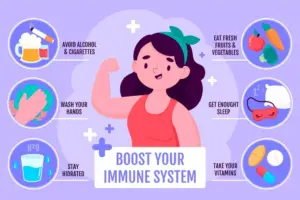A varicose vein is a swollen, twisted vein beneath the skin. Most commonly, they occur in the legs, but they can also occur elsewhere. A type of varicose vein is hemorrhoids.
The flow of blood toward your heart is maintained by one-way valves in your veins. Having weak or damaged valves can cause blood to pool in your veins. The veins swell as a result, which can cause varicose veins.
The prevalence of varicose veins is very high. The risk of varicose veins increases with age, female gender, obesity, lack of exercise, and family history. Pregnancy can also increase the likelihood of them.
The diagnosis of varicose veins is usually made by a physical exam. Additional tests like Doppler USG may be required in some cases.
The most effective way to prevent varicose veins from getting more severe is to exercise, lose weight, elevate your legs when you are resting, and avoid crossing them when sitting. A loose-fitting outfit and avoiding prolonged standing can also help. You may be able to have varicose veins removed if they’re painful or bother you.
To discuss diagnosis and treatment options, please book an appointment with our specialist.
To learn more about varicose veins, please click on:
Dr Ibrahim Yahli MD MRCPsych



